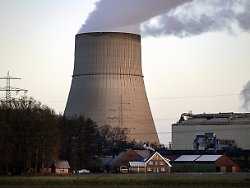“Grotesque mock debate”
Environmental groups criticize possible nuclear power plant extension
4/21/2022, 1:31 p.m
In order to compensate for the failure of Russian gas supplies, the continued operation of German nuclear power plants is repeatedly demanded. But in addition to the nuclear threat, the project harbors a not insignificant contradiction: the majority of the uranium imports also come from Russia.
In view of demands for the continued operation of German nuclear power plants, environmental groups have referred to the high dependency on uranium deliveries from Russia. About 40 percent of the European uranium imports came from Russia and Kazakhstan, explained the Bund für Umwelt und Naturschutz Deutschland (BUND) and other organizations when presenting the new edition of the “Uranium Atlas”. This also applies to “the German nuclear power plants that are still running”. They would “operate to a large extent with it”.
Against this background, BUND chairman Olaf Bandt criticized Bavaria’s Prime Minister Markus Söder’s call for German nuclear power plants to continue operating beyond the end of the year. “Markus Söder is conducting a grotesque sham debate,” explained Bandt. “In view of the nuclear threat posed by nuclear power plants in the war zone” and threats by Russian President Vladimir Putin with atomic bombs, his calls for nuclear power are “a political and moral indictment”. This applies all the more in view of “Europe’s dependence on Russian and Kazakh uranium”.
In Germany, there are repeated calls for the last three nuclear power plants still in operation to be extended in order to compensate for possible supply shortfalls in Russian gas against the background of the Ukraine war. Economics Minister Robert Habeck and Environment Minister Steffi Lemke have spoken out against this step.
Russia in top position in uranium business
The uranium atlas is broadcast and published by BUND together with the Nuclear Free Future Foundation, the Rosa Luxemburg Foundation and the environmental foundation Greenpeace. It contains information on the nuclear power and uranium mining industry worldwide. Its new edition was published on April 26, 1986 to mark the 36th anniversary of the Chernobyl reactor disaster.
According to the Uranium Atlas, the Russian state-owned company Rosatom has a leading position in the international uranium business. It supplies more than a third of the enriched uranium required for the operation of nuclear power plants worldwide. Eastern Europe is particularly dependent on Russian fuel elements: 18 reactors in the EU can only be operated with hexagonal Russian fuel elements.
“If Europe really wants to end its dependence on Russia in the energy sector, it must also end its cooperation with Russia in the nuclear sector as quickly as possible,” demanded Uwe Witt, officer for climate protection and structural change at the Rosa Luxemburg Foundation. Greenpeace representative Heinz Smital pointed out that renewable energies “are now cheaper than coal, gas or nuclear power plants, even if you don’t count their follow-up costs.”
